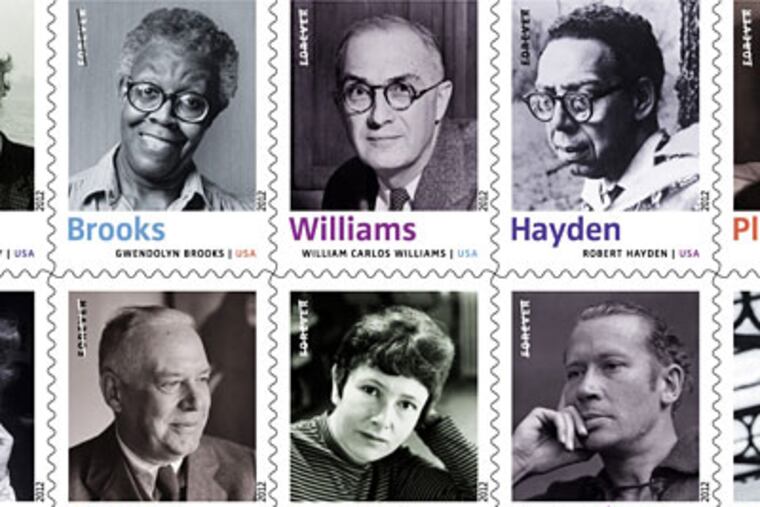USPS putting its stamp on U.S. poets
It's quite a bunch. And it tells us much about the United States of America - and its poets. In 2012, the U.S. Postal Service will bring out a series of "Forever" stamps dedicated to U.S. poets of the 20th century. Tentatively, they're to be dedicated March 3 at the Association of Writers and Writing Programs Conference in Chicago, says Roy Betts of the Postal Service.

It's quite a bunch. And it tells us much about the United States of America - and its poets.
In 2012, the U.S. Postal Service will bring out a series of "Forever" stamps dedicated to U.S. poets of the 20th century. Tentatively, they're to be dedicated March 3 at the Association of Writers and Writing Programs Conference in Chicago, says Roy Betts of the Postal Service.
Poets have been on our stamps before, as standout Americans, among them Emily Dickinson, Walt Whitman, Carl Sandburg, T.S. Eliot, Robert Frost, and Bryn Mawr grad Marianne Moore. But the new lineup keeps to that most poetic of centuries, the 20th. The selections speak "to the importance of poetry in American life," says poet E.D. Hirsch. "The U.S.P.S. is making a key statement here. . . that poetry is a necessary part of our culture."
The lineup: Elizabeth Bishop, Joseph Brodsky, Gwendolyn Brooks, E.E. Cummings, Robert Hayden, Denise Levertov, Sylvia Plath, Theodore Roethke, Wallace Stevens, and William Carlos Williams. All are deceased, Brooks most recently (2000).
The list "does a very good job of mixing a range of styles and voices," says Kim Bridgford, poet and director of the Poetry Center of West Chester University. These 10 are four women, six men, two African Americans (Brooks and Hayden), one poet who could be considered Latino by virtue of his Puerto Rican mother (Williams), and two naturalized immigrants (Brodsky and Levertov).
Greg Djanikian, poet and director of the creative-writing program at the University of Pennsylvania, says these last two "might be a tip of the hat to the great immigrant influx in the U.S. in the last two centuries (which includes my family, by the way)."
Geographically, it has no poets west of the Mississippi, with Brooks (Illinois) and Hayden (Michigan) its westernmost members. There are local connections, with Stevens, born in Reading, and Williams, a graduate of the Penn Med School. For a time, Roethke taught at Lafayette College in Easton.
It's an album of diverse lives. There's an insurance executive (Stevens), homemakers, academics, a family doctor (Williams), and a World War I ambulance driver (Cummings). There's a lesbian (Bishop), a suicide (Plath), and a couple of alcoholics. There are lifetime happy marriages (Brooks, Hayden), messy divorces (Plath), and alternative arrangements (Bishop, Cummings). This bunch piled up many honors, including a Nobel (Brodsky).
There are outspoken liberals (Levertov), conservatives (Stevens), and one lefty who swung right (Cummings). Because of his leftward politics, Williams was blocked in 1952-53 from being the then-equivalent of the Poet Laureate at the Library of Congress. The group has at least one agnostic (Bishop), one Jew (Brodsky), one transcendentalist (Cummings), one Bahá'i (Hayden), one Catholic convert (Levertov), and, among its atheists, Stevens, whose deathbed conversion to Catholicism is one of the most hotly debated did/didn'ts in literary history.
So is anyone missing? Allen Ginsberg, Beat poet supreme, is notable by his absence. Djanikian is surprised: "A lot of people know Ginsberg given his political stature during the '60s and '70s," he says. The Ginsberg work "Howl" "is a groundbreaking poem."
Quips Lynn Levin, a poet and teacher at Penn and Drexel: "It would have been a howl to see Ginsberg in the group."
Hirsch would like to have seen Hart Crane, the brilliant modernist who was an apparent suicide in 1932. Djanikian and Hirsch wonder at the absence of Robert Lowell, often paired with Bishop in discussions of late-century poetry. And Djanikian points out that towering eminence Ezra Pound, because of his Fascist leanings during World War II, may never get onto a stamp.
And whom would you drop? Hirsch likes Levertov but considers her inclusion "a stretch," suggesting other poets, such as Louise Bogan, Robert Creeley, or Frank O'Hara before her.
Levin hopes for a future series to fete Latino, African American, and indigenous American poets. She also thinks Plath is "an overrated poet. . . the diva of her disasters," made sensational by her mental issues, marital woes, and sad end. Levin asks: "On what sorts of mail would you use the Plath stamp?. . . Not such a good choice for wedding invitations, thank-you notes, or condolence cards." She suggests the marvelous poet Jane Kenyon instead.
On one thing, all agree: The series reminds us of the ways poetry can intervene in and improve our lives.
"I've seen people weep in class at Hayden's 'Those Winter Sundays' and rush out and call their parents to tell them how much they love them," says Bridgford. Brooks' "We Real Cool" is "similarly memorable and life-changing."
Hirsch quotes Stevens himself, who said poetry "has something to do with our self-preservation" and "helps us to live our lives."